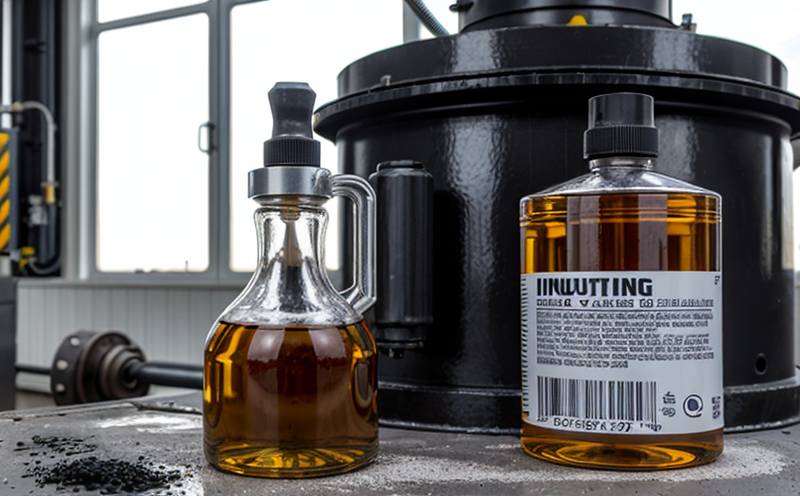ASTM D1319 Hydrocarbon Composition Testing in Oils
The ASTM D1319 hydrocarbon composition test is a critical procedure used to characterize the hydrocarbons present in industrial lubricants, hydraulic fluids, and other oil-based products. This quantitative analysis of the hydrocarbon components helps determine the quality, purity, and potential degradation levels of these oils. The primary objective of this testing method is to ensure that the oils meet the specified requirements set by industry standards such as ASTM D1319-20.
The test involves several steps including sample preparation, dissolution, and analysis using gas chromatography techniques. Sample preparation typically includes degassing and filtration to remove any particulate matter or air bubbles which could interfere with accurate measurements. Dissolution of the oil in a suitable solvent like methylene chloride is followed by injection into a gas chromatograph.
Gas Chromatography (GC) plays an integral role in ASTM D1319 as it allows for precise separation and quantification of individual components within the hydrocarbon mixture. This process enables detailed analysis of both major and minor constituents present in the oil sample, providing insights into its chemical composition. Understanding these details is crucial for maintaining optimal performance characteristics of industrial oils.
Accurate determination of hydrocarbon content is essential for assessing the condition of lubricants during their lifecycle. By monitoring changes over time through periodic testing according to ASTM D1319 guidelines, potential issues related to oxidation or contamination can be identified early enough to implement corrective measures before they lead to equipment failures.
Furthermore, this test aids in evaluating oil compatibility with different types of machinery and components used across various industries. It ensures that the chosen lubricant will not only perform effectively but also remain stable under operating conditions without causing adverse effects on machine parts or environments where it is applied.
The results obtained from ASTM D1319 testing provide valuable information about the baseline composition of an oil sample at any given time. This knowledge allows for better decision-making regarding maintenance schedules, replacement intervals, and overall asset management strategies within industrial settings.
Eurolab Advantages
- Precision & Reliability: Our state-of-the-art equipment ensures accurate results every time, adhering strictly to ASTM D1319 standards.
- Expertise & Experience: Our team of certified professionals brings years of experience in performing complex analytical tests like this one.
- Comprehensive Reporting: We provide detailed reports that offer not just quantitative data but also actionable insights based on our analysis.
International Acceptance and Recognition
ASTM D1319 hydrocarbon composition testing has been widely accepted across multiple sectors due to its robustness and reliability. It is recognized internationally by organizations such as ISO (International Organization for Standardization), which incorporates similar principles into its own standards related to fuel and lubricant quality control.
Many industries rely on ASTM D1319 because it provides a standardized approach that ensures consistency in testing methods worldwide. This standardization facilitates better communication between manufacturers, suppliers, distributors, and end-users who operate globally or have interconnected supply chains.
The acceptance of this test extends beyond mere compliance; it fosters trust among stakeholders by ensuring high-quality products consistently meet specified criteria regardless of geographical location. As such, companies adhering to ASTM D1319 standards gain competitive advantages in terms of reputation and market access.
Competitive Advantage and Market Impact
- Enhanced Product Quality: By consistently meeting ASTM D1319 requirements, businesses can ensure their products are superior in terms of purity and efficiency.
- Customer Satisfaction & Loyalty: Meeting such stringent standards demonstrates commitment to quality which translates into satisfied customers who are likely to become loyal advocates for the brand.
- Market Access Opportunities: Adhering to internationally recognized standards opens doors to new markets where these criteria are mandatory or preferred by buyers.





